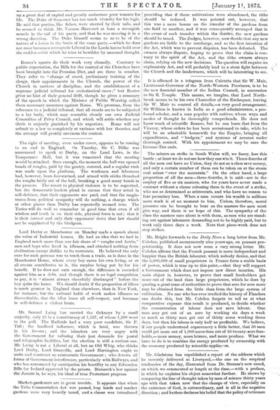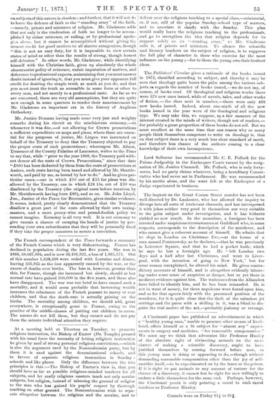Mr. Gladstone has republished a report of the address which
he recently delivered at Liverpool,—the one on the sceptical tendencies of the day, illustrated from Dr. Strauss's new creed, on which we commented at length at the time,—with a preface, in which he explains his object somewhat further. He shows by comparing the line of thought taken by men of science thirty years ago with that taken now that the change of view, especially on the existence of God, is extraordinary, and is all in the negative direction ; and hethen declares his belief that the policy of reticence
,son subjects of this nature is obsolete ; and further, that it will not do to leave the defence of faith to the "standing army of the faith, —namely, priests and ministers of religion. Mr. Gladstone adds that not only is the vindication of faith no longer to be accom- plished by either reticence, or railing, or by professional apolo- gies alone, but it cannot be accomplished without giving the utmost credit for good motives to all sincere antagonists, though " this is not an easy duty, for it is impossible to view certain states of mind as other than the results of strong, though honest self-delusion." In other words, Mr. Gladstone, while identifying himself with the Christian faith, gives up absolutely the whole obscurantist policy of reticence, unfair imputation of motives,, and deference to professional experts, maintaining that youmust answer 'doubt instead of ignoring it, that you must,give your opponent full 'credit for desiring the simple truth as much as you do, and that you must treat the truth as accessible in some form or other to every man, and not merely to a professional, caste. As far as we are concerned, these are very old assumptions, but they are quite new enough in some quarters to render their announcement by Mr. Gladstone an important era in the history of Anglican Orthodoxy.



































 Previous page
Previous page